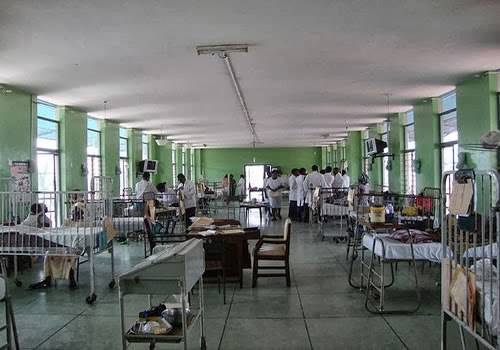
For several years, Nigeria has consistently spent only about one per cent of its GDP on health, a professor has said.
The Provost of the College of Medicine of Ekiti State University Teaching Hospital, Kehinde Oluwadiya, said public spending on health in Nigeria amount to only 1 per cent of the country’s GDP.
According to the don, governments at the various levels have been spending just over one-third of what should have been spent on the health of the citizens.
Mr. Oluwadiya, a professor of medicine, disclosed this while delivering a lecture organized by the Association of Resident Doctors of Ladoke Akintola University of Technology Teaching Hospital, LAUTECH, Osogbo chapter.
The lecture, titled “Impact of Present Economic Challenges on Health Indices in Nigeria and Medical Practice in Nigeria as a whole”, was held over the weekend.
According to a Channels television news report, the provost said statistics showed that the government only spent one per cent of Nigeria’s GDP on health in 2013, a figure he noted has remained unchanged since 1995.
“Please, note that there is a difference between GDP and budget. Nigeria has spent eight point something on the budget but when you look at the GDP in general, it is only one per cent that Nigeria has been spending since 1995 when ideally it should be spending five percent.
According to him, part of the reasons for Nigeria’s low performance was that most of the GDP does not go through the government.
“Currently Nigeria ranks the very lowest in the world on government revenue as a percentage of GDP and one of the reasons is because our tax system is extremely poor.
“If Nigeria has the same efficient tax structure as Lagos, then government can generate more and invest in the health sector,” the don said.
Speaking on the economic situation in the country, he said it has “led to an increase in prices of commodities, including drugs.”
This, he said, was making people, who could not afford medicine, go for cheaper ones which were mostly counterfeits.
He added that government is spending less than what is needed on each person’s health annually.
“Government is spending an average of $31 but in order for the government to provide just the basic health need of an average Nigerian, they should be spending $86 per person.
This means that the government is only spending 36 per cent of what it’s supposed to spend”.
He pointed out that “if the government can have the political will to invest in health, “it will outlast this recession”.
Mr. Oluwadiya, however, encouraged the resident doctors to continue to uphold professionalism in rendering medical service to patients.
The president of the Association of Resident Doctors of the university, Olayinka Owolabi, in an interview said the need to encourage members to understand Nigeria’s current status informed the gathering and the topic.
“In this period of recession, in this period of economic challenges, there is the tendency for our people to actually access alternative healthcare services.
“They now patronise religious centres and traditional medicine for things they should ordinarily go to the hospital for”.
He, however, called on the government to intervene and see health as wealth.
Credit: premiumtimesng.com